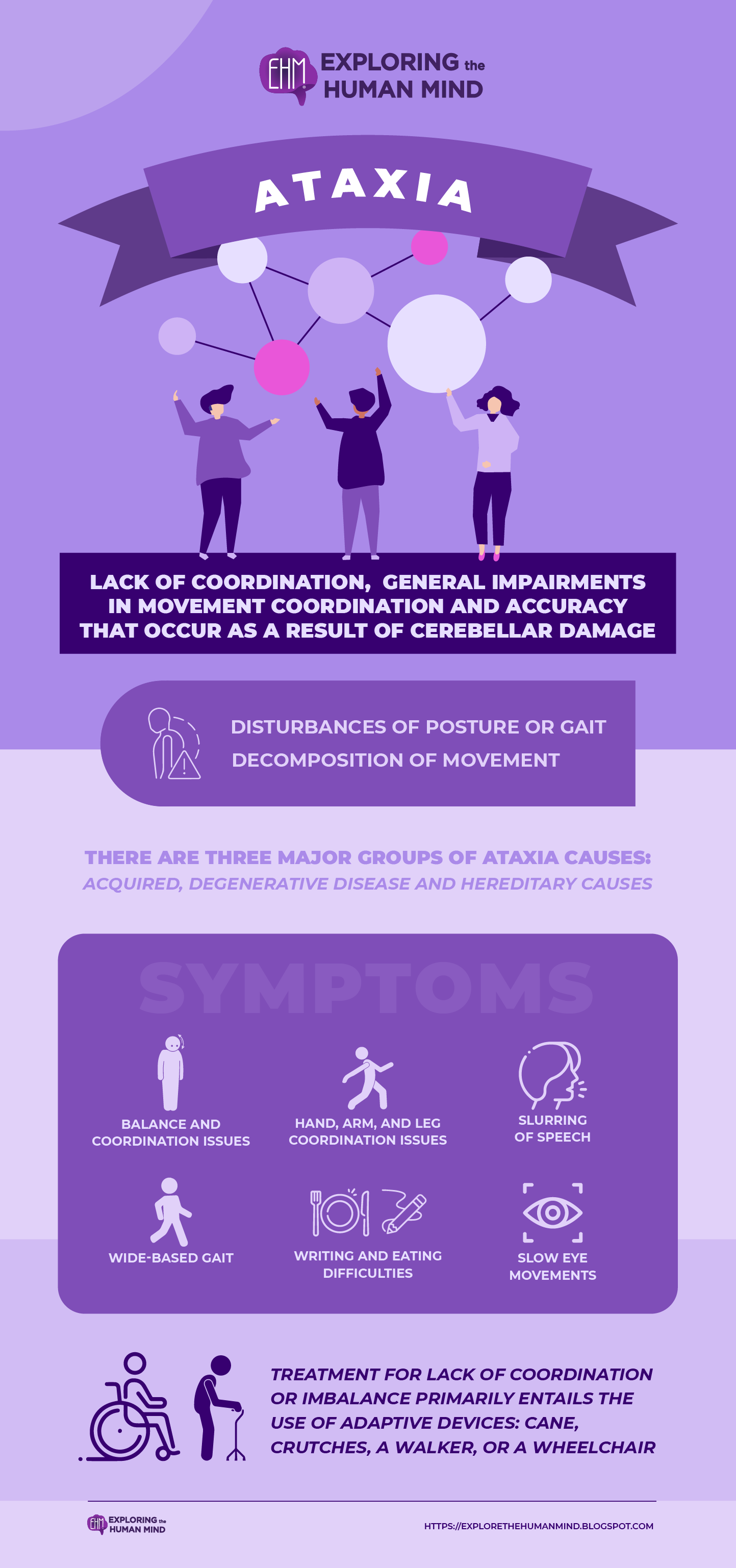Ataxia
There are two major forms of cerebellar ataxia.
- Disturbances of posture or gait result from lesions to the vestibulocerebellum. Patients have difficulty maintaining their posture due to the loss of fine-control mechanisms programmed by cerebellar circuits that translate vestibular signals into precise, well-timed muscle contractions to counteract small sways in the body. As a result, patients frequently develop abnormal gait and stances to compensate. When the patient stands still, for example, the feet are often spaced widely apart to provide a more stable base for maintaining balance.
- Decomposition of movement results from the loss of the cerebellum's ability to coordinate the activity and timing of many muscle groups to produce smooth, fluid movements. Instead of performing each movement all at once in a coordinated fashion, cerebellar patients decompose each movement into its component parts and perform them in serial.
Causes
Ataxia can be caused by damage to the part of your brain that controls muscle coordination (cerebellum) or its connections. The cerebellum connects to the brainstem at the base of the brain. The cerebellum is responsible for controlling balance, eye movements, swallowing, and speech. Muscles become less and less responsive to brain commands as the disease progresses. This impairs balance and coordination.
There are three major groups of ataxia causes: acquired, degenerative disease and hereditary causes.
Symptoms
Symptoms and onset time may differ depending on the type of ataxia. The most common are typically:
- Problems with balance and coordination (affected first)
- Hand, arm, and leg coordination issues
- Slurring of speech
- Wide-based gait (walking style)
- Writing and eating difficulties
- Eye movements that are slow
Ataxia symptoms can mimic those of other medical conditions or problems. Always consult your doctor for a diagnosis.
If you don't have a condition that causes ataxia, such as multiple sclerosis, see your doctor as soon as possible if you:
- lose balance
- lose muscle coordination in a hand, arm or leg
- difficulty walking
- slur your speech
- difficulty swallowing

vectors by Freepick; graphic design by Vadot
Treatmen
There is no cure for hereditary ataxia. Furthermore, there is no medication to treat the specific symptoms of ataxia.
If ataxia is caused by a stroke, a lack of vitamins, or exposure to a toxic drug or chemical, treatment is tailored to those specific conditions.
Treatment for lack of coordination or imbalance primarily entails the use of adaptive devices to allow the person to maintain as much independence as possible. These devices may include a cane, crutches, a walker, or a wheelchair. Physical therapy, speech therapy, and medications to treat symptoms such as tremor, stiffness, depression, spasticity, and sleep disorders may also be beneficial.
Reference:
Disorders of the Motor System (Section 3, Chapter 6) Neuroscience Online: An Electronic Textbook for the Neurosciences | Department of Neurobiology and Anatomy - The University of Texas Medical School at Houston. (2020). Tmc.edu. https://nba.uth.tmc.edu/neuroscience/m/s3/chapter06.html
Ataxia. (2023). Hopkinsmedicine.org. https://www.hopkinsmedicine.org/health/conditions-and-diseases/ataxia#:~:text=What%20is%20ataxia%3F,speech%2C%20and%20even%20eye%20movements.
Ataxia - Symptoms and causes. (2022). Mayo Clinic; https://www.mayoclinic.org/diseases-conditions/ataxia/symptoms-causes/syc-20355652






Comments
Post a Comment